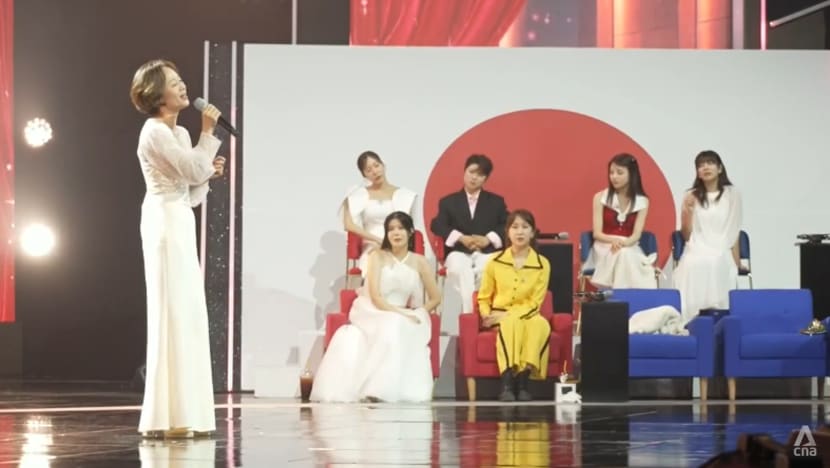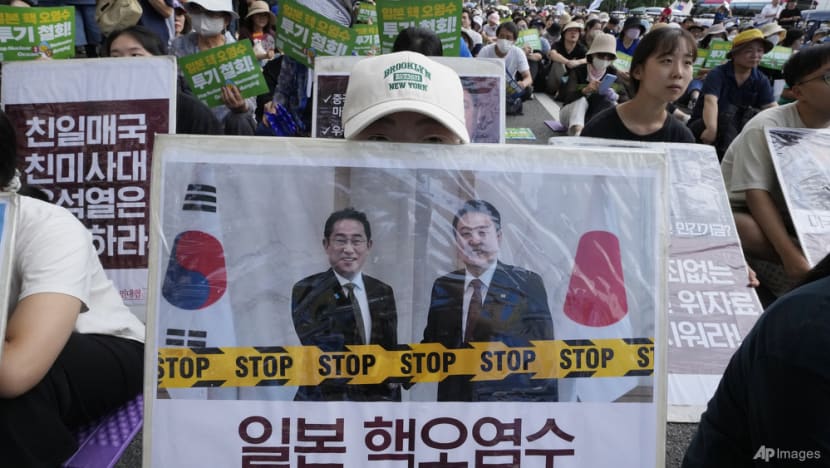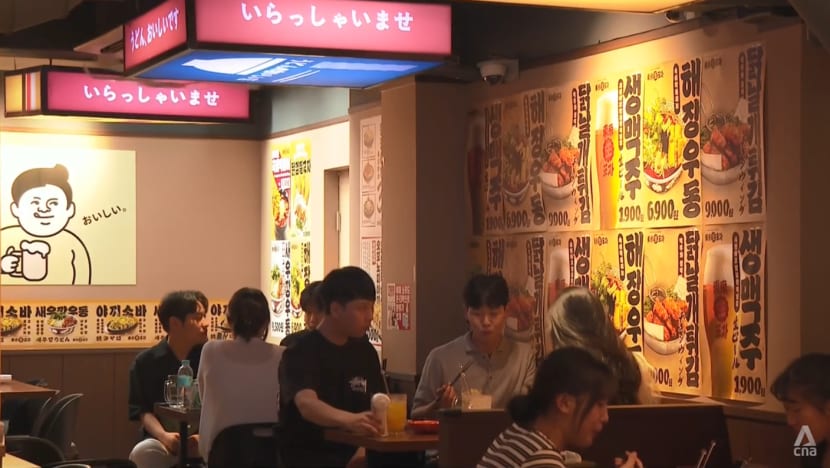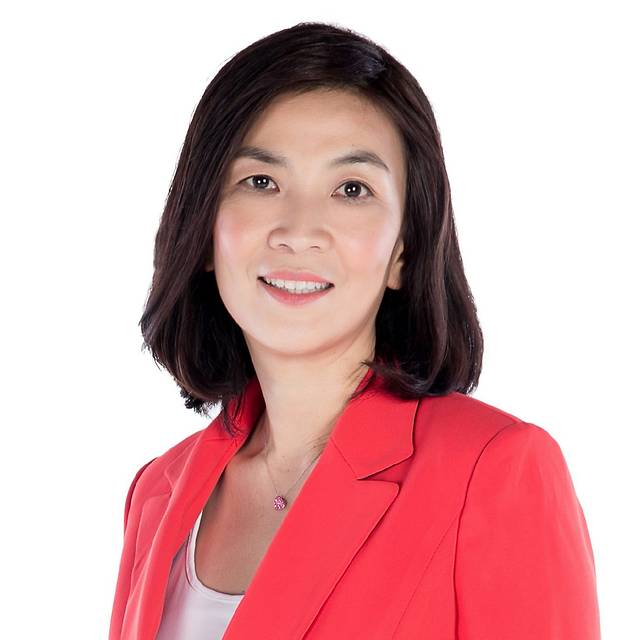Japanese music and food find growing acceptance in South Korea amid warming bilateral ties
Restaurants serving Japanese food are easy to find in Seoul and bustling on weekends, while J-pop is growing in popularity among South Korea's youths.

Japanese singer Utagokoro Rie performs on the “Korea-Japan Top 10 Show” a music entertainment programme on South Korean network MBN.

This audio is generated by an AI tool.
SEOUL: Japanese songs sung by Japanese singers live on a South Korean television network would have been unthinkable a few years ago.
But in recent months, Japanese singers have been winning the hearts of many on a hit South Korean music entertainment programme.
Named the “Korea-Japan Top 10 Show”, it pits famous singers from the two nations in friendly competition on major cable network MBN.
Viewership reached as high as 5.7 per cent in the third week of its 12-week run, and the show’s website has more than 3,000 supportive comments.
It started airing in May after another programme with a similar theme ended its run earlier this year with a positive reception from the audience.
Seoul-based CReA Studio, which created both shows, said it took a big risk bringing the concept to life.
“There were concerns that this (concept) could cause some backlash. But surprisingly, people responded very positively,” the studio’s CEO Seo Hye-jin said.
She added that viewers found the two shows “sensational”, as Japanese songs have never been played on mainstream South Korean television before.
INITIAL WORRIES ON RECEPTION
South Korea’s free-to-air networks generally do not show Japanese content.
Wounds dating back more than a century still linger between the two nations, when South Korea was under 35 years of Japanese colonisation.
Some South Korean singers who were invited to participate in the music show were initially worried as they were unsure how the public would react to them singing in Japanese.
"I thought it would be great if I could, as a singer, take part in this historic moment, when we can sing songs and become one (through music),” said veteran South Korean singer Lyn.
“Even though we speak a different language, Korean viewers were very receptive to it, and I don’t think they linked it to any painful historical events or other things."
Japanese singer Utagokoro Rie, also a participant on the show, said she was not aware of the grim past between the two countries before making her first ever trip to South Korea for the programme.
“When I first appeared on the show and sang, I wasn't thinking about (politics) at all,” the 51-year-old told CNA.
“But after this show aired, I heard Koreans say I'm a bridge between South Korea and Japan. I felt a sense of responsibility when they said that to me.”
SOUTH KOREA-JAPAN TIES
After South Korean President Yoon Suk Yeol took office in 2022, relations between Seoul and Tokyo saw rapid improvement.
He and Japanese Prime Minister Fumio Kishida resumed reciprocal visits as the two countries' leaders, a practice that had been suspended since 2011.
Both leaders are keen to solidify security cooperation – alongside common allies including the United States – to better cope with North Korea’s nuclear threats.
The camaraderie today is in stark contrast to just five years ago, when Koreans took to the streets against Japan’s export restrictions on some of South Korea’s key industrial materials.
The curbs in 2019 was Tokyo’s retaliation in a series of tit-for-tat moves, following an order by South Korea’s top court for Japanese firms to compensate Korean victims of Japan’s wartime forced labour.
President Yoon now plans to use local funds for the victims, instead of seeking direct compensation from Japanese firms.
DECADES AFTER NORMALISING TIES
Next year, the two nations are expected to elevate their bilateral ties as they celebrate 60 years of diplomatic relations.
But deep-rooted anti-Japanese sentiments remain among South Koreans, who say it is crucial for Japan to reaffirm its recognition of historical facts that have strained bilateral ties for decades.
"It can be highly regarded that exchanges of people and goods between South Korea and Japan have been fully restored,” said Yang Kee-ho, a Japanese studies professor at Sungkonghoe University.
“However, the problem is that these aspects have not brought visible results that the South Korean people (want to see) … such as (Japan) completely conceding on historical issues.”

A recent sore point was Japan's release of treated radioactive water from the Fukushima nuclear power plant into the ocean. Thousands of protesters rallied along the streets of Seoul against Japan and denounced the South Korean government’s stance on seeing no scientific problems with the water release.
Visits by Japanese politicians to the controversial Yasukuni shrine – seen by many nations as a symbol of the country’s wartime aggression – are also often a point of contention for South Koreans.
JAPANESE CULTURE IN SOUTH KOREA
While dissatisfaction and underlying tensions remain, there is also growing acceptance of Japanese culture in South Korea.
Restaurants serving Japanese food – owned by South Koreans – are easy to find in Seoul and bustling on weekends.
“In the past, there was a lot of talk about ‘no Japan’ and excluding Japanese culture. But these days, Japanese culture is being more embraced,” said one customer dining at an izakaya, a Japanese bar.

The izakaya’s owner Kim Tae-kyung told CNA he considered the two countries' ties before opening the venue about a month ago because he had seen how anti-Japanese sentiments can affect Japan-related businesses in South Korea.
"(These days), lots of young people are travelling to Japan and they like Japanese culture, and so I thought it would be all right to open an izakaya,” he said.
Japanese pop and rock music are also growing in popularity, particularly among youths, with some bands enjoying sold-out concerts in South Korea.
Still, the two nations’ diplomatic relations wane and wax with each administration.
As Japan’s Kishida is set to resign next month, there are concerns that their warming ties could once again be tested when the next prime minister takes the reins.
However, analysts said they expect minimal changes to diplomatic relations, given that Kishida’s successor is likely to follow in his footsteps when it comes to foreign policy.

















